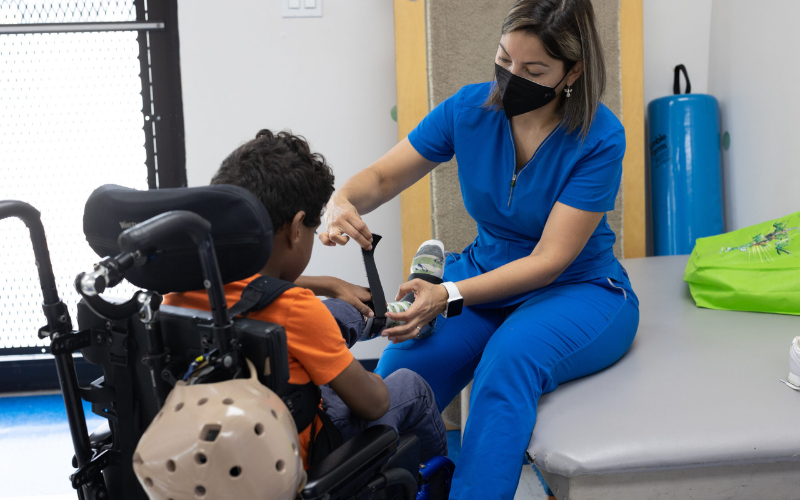Table of Contents
×- What Is Prescribed Pediatric Extended Care (PPEC) and Who Does It Serve?
- Benefits of Prescribed Pediatric Extended Care (PPEC)
- How Prescribed Pediatric Extended Care (PPEC) Fits Into the Pediatric Healthcare System
- Choosing the Right PPEC Program: Why Families Consider Children’s Rehab
- Prescribed Pediatric Extended Care (PPEC) as a Lifeline for Families
- Frequently Asked Questions About Prescribed Pediatric Extended Care (PPEC)
Prescribed Pediatric Extended Care (PPEC) offers a vital bridge between medical care and early childhood development for children with complex medical needs. Unlike traditional daycare or standard healthcare settings, PPEC centers provide skilled nursing and therapeutic services in a nurturing environment. This model ensures children receive both medical oversight and opportunities for growth, learning, and socialization. In this article, we’ll explore what PPEC is and who it serves, the benefits for families, how it fits into the healthcare system, and how parents can choose the right program.
What Is Prescribed Pediatric Extended Care (PPEC) and Who Does It Serve?
Prescribed Pediatric Extended Care (PPEC) is a specialized pediatric program that provides medically necessary nursing care and therapy services in a social setting. Unlike hospitals or in-home nursing, PPEC centers combine healthcare and developmental support in a daycare-like environment. This makes it distinct from traditional daycare, where medical care is unavailable, and hospitals, which focus more on acute treatment than ongoing developmental needs.
Eligibility for PPEC services is based on a physician’s prescription and medical necessity. Children who qualify often have chronic or complex health conditions that require skilled nursing care throughout the day. These conditions may include respiratory support needs, developmental delays, neurological conditions, congenital disorders, or even recovery after surgery. Each child’s enrollment is tailored to their medical and developmental requirements.
Services Provided in PPEC Centers
PPEC centers provide comprehensive services, including:
- Skilled nursing care for monitoring and administering treatments.
- Therapy services such as physical, occupational, behavioral, and speech therapy.
- Socialization and developmental activities to encourage growth and interaction.
- Care coordination with physicians, therapists, and specialists to align with individualized care plans.
Benefits of Prescribed Pediatric Extended Care (PPEC)
For Children with Complex Medical Needs
Children in PPEC centers thrive in an environment that balances medical oversight with developmental opportunities. Licensed nurses ensure safety, while therapists support physical, cognitive, and social progress. The group setting also promotes peer interaction, helping children build friendships and social skills.
For Families and Caregivers
For families, PPEC provides peace of mind knowing their child is under expert supervision. It eases the burden of full-time caregiving, allowing parents to work, manage household responsibilities, or attend to their health. Additionally, many PPEC centers assist families in navigating insurance coverage, medical referrals, and available community resources.
How Prescribed Pediatric Extended Care (PPEC) Fits Into the Pediatric Healthcare System
Unlike home health nursing, which is one-on-one, PPEC combines skilled care with socialization. Compared to hospitals or outpatient clinics, PPEC is not limited to treatment but supports daily living and development. While traditional daycare provides a safe setting for healthy children, it cannot accommodate those with complex medical needs, which is where PPEC steps in.
PPEC centers work closely with pediatricians, specialists, and insurers to create personalized care plans. Effective communication ensures that treatments, therapies, and medical updates are shared seamlessly among the child’s care team, supporting continuity and better health outcomes.
Choosing the Right PPEC Program: Why Families Consider Children’s Rehab
When selecting a PPEC center, families should look for accreditation, experienced staff, and availability of therapy services. Proximity and convenience also matter, as regular attendance supports consistent progress. Parents are encouraged to ask key questions about nurse-to-child ratios, therapy offerings, physician communication, and insurance coverage to ensure the program meets their child’s needs.
Prescribed Pediatric Extended Care (PPEC) as a Lifeline for Families
Prescribed Pediatric Extended Care (PPEC) offers far more than medical supervision—it provides children with complex needs a safe, enriching environment while giving families vital support. For parents navigating the challenges of raising a medically fragile child, PPEC serves as a lifeline, blending healthcare, education, and community. Exploring this option can make a transformative difference for both children and caregivers.

Frequently Asked Questions About Prescribed Pediatric Extended Care (PPEC)
If your child has a complex medical condition that requires nursing care or medication administration throughout the day, they likely qualify for PPEC. If you are unsure, please call or walk in and we will help you determine your child’s eligibility.
PPEC is always covered by Medicaid, CMS, and Sunshine. Private coverage varies, it is best if you reach out to us or your insurance provider for more information.
PPEC combines skilled nursing with therapy and peer interaction, while home nursing is only one-on-one nursing care.
Registered nurses (RN), licensed practical nurse (LPN), certified nursing assistants (CNA), and therapists (physical, occupational, speech, and behavioral).
Yes, children have the option to attend school in PPEC with our private school teacher, or attend school and come to PPEC for our afterschool program.

